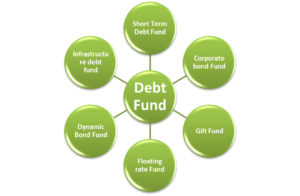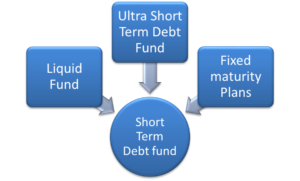Debt Mutual Fund
Investors who are not comfortable in risk associated with equity and prefer capital protection over volatility, Debt mutual fund will be the right choice for them. Debt funds mostly invest in debt securities such as Treasury Bills, Government Securities, Bonds and debentures. These securities have a fixed maturity date and pay a specific rate of interest. When we compare debt funds and equity funds then Debt funds are safe bet. But debt funds also have risk associated with them. Debt funds inherit interest rate risk. Higher the time horizon of investment there is higher the risk. Also there is a risk of default. Let us understand these:
Interest Rate Risk
Let us assume that you have invested in a bond of 7% coupon rate and at that time interest rates were 6%. Means you made a good investment. But after some time interest rates roses to 8%. That means you are earning less on your investment. This is interest rate risk.
Risk of Default
You have invested in bonds of ABC ltd having maturity of 10 years. After 5 years company faces slowdown and defaulted in its payment of interest and principal.
In mutual funds, investment is diversified by investing in different instruments of different maturities but any of the above risk can affect your returns.
Debt mutual funds are of various types. Investor can choose any of them according to his objective.
Corporate Bond Fund
Corporate bond funds invest in portfolio of gilt and corporate bonds of rated companies which are capable to provide high returns with low amount of risk. These funds are primarily open ended funds. You can purchase and redeem any time. But you must keep in mind that redemption charges and rules are different in debt fund than equity funds. SBI Corporate Bond Fund, HDFC Corporate Bond Fund, Reliance Prime Debt fund, Franklin India Corporate Bond Fund are some example of Corporate Bond funds.
Gilt Fund
Gilt funds invest in fixed interest securities of various maturities of central and state government. They have no credit risk as govt never defaults on payment. But this fund inherits interest rate risk. Some examples of Gilt funds are ICICI Prudential Gilt fund, Reliance Gilt Securities Fund, Canara Robeco Gilt PSG fund, UTI Gilt fund, SBI Mangnum Gilt fund.
Floating Rate Fund
A floating rate fund invests in those instruments which pay variable or floating interest rates. Interest rates on these instruments fluctuate with an underlying interest rate level. These kind of funds provide higher returns compared to high rated bond funds. But these funds inherit high risk because they invest in debt of borrowers with low credit quality. Some examples of floating rate funds are HDFC floating rate debt fund, Aditya Birla Sun life Floating Rate fund, Reliance floating rate fund.
Dynamic Bond Fund
In this kind of funds, fund manager invests in debt instruments of different maturities and different coupon rates to take advantage of changing interest rates. These funds are best for investment for those who want to generate regular income. Some examples of Dynamic Bond Funds are IDFC dynamic Bond fund, Axis dynamic bond fund, SBI dynamic Bond fund, L&T flexi bond fund.
Infrastructure Debt fund
Infrastructure debt funds are specifically created to encourage investment in infrastructure. However, an infrastructure debt fund can be set up either as a Trust or as a Company. If it is a Trust, it is presumed as Mutual fund and it will be regulated by SEBI and if it is a company, than it will be a NBFC and regulated by RBI.
Short Term Debt Fund
These debt funds invest in portfolio of very short term debt instruments for stable NAV. These Funds are of different subtypes.
– Liquid Fund
These funds invest in a portfolio of debt securities with very short term maturity of less than 91 days. These are suitable for those who want to park funds for short duration and want to earn interest income on fund. These funds are mainly used by large corporate investors and institutional investors.
– Ultra Short Term Debt Fund
These debt funds invest in a portfolio of very short term debt securities with a small portion in longer term debt of less than one year. These funds provide higher return compared to liquid funds and have higher risk too. Its works on high risk high return theory.
– Fixed Maturity Plans
Fixed Maturity Plans invest in portfolio of debt securities with definite tenor. These schemes can only be redeemed on maturity. These are compulsorily listed on a recognized stock exchange.
This is all about debt mutual funds. Hope you will find it beneficial for your investment decision.






